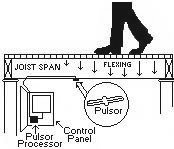Pulsor 50th Anniversary
Celebrating 50 years of excellence
What is a Pulsor?
 The Pulsor is a movement-sensing device that responds to the physical
flexing of the material to which it is mounted, typically floor joists,
cantilever decking, roof rafters, etc. It responds only to movement
characteristic of a walking person. It will not respond to shock,
vibration, snow loads, building settling, or the environment.
The Pulsor is a movement-sensing device that responds to the physical
flexing of the material to which it is mounted, typically floor joists,
cantilever decking, roof rafters, etc. It responds only to movement
characteristic of a walking person. It will not respond to shock,
vibration, snow loads, building settling, or the environment. When a
person walks across the floor, the floor and its supports bow downward.
They then return to normal as the person walks away from the targeted joist.
The Pulsor senses this flex (downward and upward) as a crystal inside it
changes resistance in response to the bending material, triggering a voltage
signal in the master processor prompting a corresponding action. The
result: an alarm is activated; a light is turned on; a camera wakens
and changes direction; water turns on in a shower; and more.
When a
person walks across the floor, the floor and its supports bow downward.
They then return to normal as the person walks away from the targeted joist.
The Pulsor senses this flex (downward and upward) as a crystal inside it
changes resistance in response to the bending material, triggering a voltage
signal in the master processor prompting a corresponding action. The
result: an alarm is activated; a light is turned on; a camera wakens
and changes direction; water turns on in a shower; and more.- PULSORS ARE easily installed in an unfinished basement or attic, and cannot be detected by the homeowner or the intruder.
- PULSORS ARE compatible with pets (up to 60 lb.) - dogs, cats, birds. Homeowners can have interior motion detection while their pets roam freely throughout the house.
- PULSORS ARE not affected by open windows, rotating fans, heating ducts, sunlight, etc.
- PULSORS DO not change a client's lifestyle. Home owners can secure their home even if their doors and windows are open. Pets can roam freely; they do not have to be crated.
- PULSORS HAVE BEEN used in the security industry since 1968. Tens of thousands of units have been successfully installed. With their strong resistance to environmental false alarms, they remain almost perfect motion detectors.
We Invite You Learn More
- Snapshot of a Pulsor Installation - Find out what goes into installating a Pulsor stress sensor system. Includes a link to the complete installation manual.
- The Pulsor - The Most Versatile, Adaptable and Stable Sensor - Application ideas for residential/commercial security, home automation and marine industry applications.
- Success Stories - Challenging and unique applications that have been successfully solved using the Pulsor stress sensor. ..And these are just the ones we know about.
- Testimonials - We are grateful for the installers who have shared their experiences with our products throughout the years.
- Product Info - Types of
Pulsors and product details.
Our Track Record
The Pulsor was first created in 1968 by Paul Sheerer of Sag Harbor Industries. First marketed under the company name Detectron, the Pulsor quickly became the security-device-of-choice of Radio Surveillance, Austin and Bob Stack's installation company based in the Hamptons on Long Island, New York. In its early days, the Pulsor did have issues with false alarms, but Austin recognizing its potential worked with his staff to develop installation techniques to successfully counter the problems. Austin and his brother realized that the Pulsor had advantages that no other product did. It is invisible, and it doesn't interfere with a person's lifestyle. In the Hamptons, people walk to the beach. They make quick trips to town. They run out to pick someone up or drop them off. They don't want to have to close up their homes, shutting every window and making sure everything is locked up. Pulsors equal freedom. People could set the alarm, let their animals wander freely, lock the front door (or not), leave and have their homes protected. Plus, Pulsors need virtually no maintenance. Once installed, people could count on their alarm system for years.
Austin and Bob sold their installation company in 1986. At that time, it was the second largest security company on the East End of Long Island and had grown to include a central station, guard services and storage for valuables. Austin credits the Pulsor for the company's success.
In the early 1980s, Detectron was purchased by Steve Hahan, and the company was renamed Hi-Stoy.
Then in September 1989, Austin and his wife, Diane, purchased the rights to the Pulsor and Sure Action's other primary product, the Probe. Austin made a number of improvements to the Pulsor, and in 1989, he and Diane began selling the stress sensors through distribution to alarm companies nationwide. Pulsors are now sold throughout the world and are used not only for security applications, but also in home automation and in the marine industry.
We know many Pulsor systems last 20+ years. Just this April (2018), Austin was on the phone with a gentleman who works for a large distributor. As they talked about marketing ideas, the gentleman raved about the Pulsors. It turns out that he has a Pulsor system in his home, which was installed in 1991, and has operated flawlessly for him.